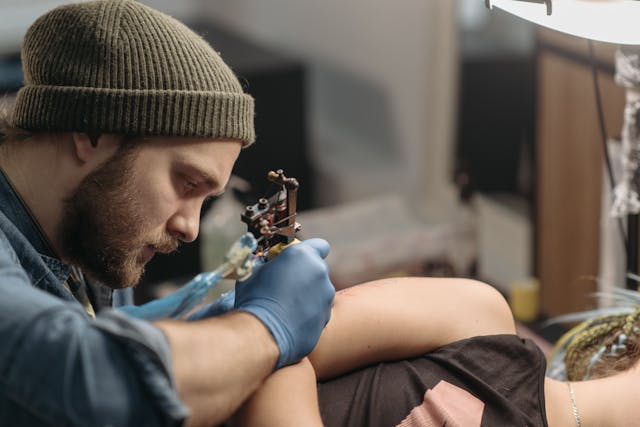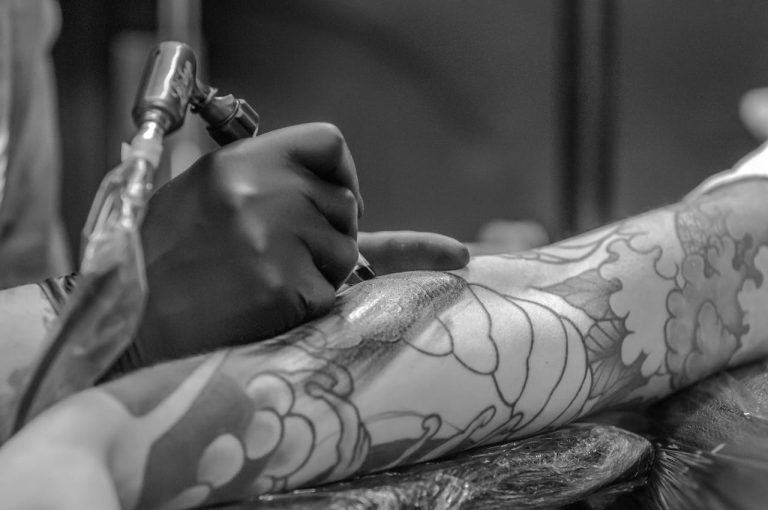A tattoo requires commitment, both in terms of the design you select and the amount of time you spend getting it done. The size, placement, and intricacy of the tattoo, in addition to the tattoo artist’s experience, can all have a significant impact on how long a tattoo session lasts. Gaining an understanding of these aspects will help you better prepare for getting inked. This article will go into great detail about tattoo durations, giving you a thorough understanding of how long to expect your next body art project to take.
Related Article: How Many Sessions to Remove a Tattoo? Discover the Truth
Factors Affecting Tattoo Duration
1. Size of the Tattoo
One of the most important variables in estimating the completion time is the size of the tattoo. Simple names or symbols are examples of small tattoos that can be completed in as little as 30 to 60 minutes. These designs can typically be finished in a single sitting and require little detail. Larger symbols or intricate sleeve tattoos may require two to five hours. Larger tattoos, such as full sleeves or back pieces, may need several, multi-hour sessions.
2. Complexity and Detail
When estimating the amount of time needed, the tattoo design’s intricacy and detail play a critical role. Intricate designs with lots of colors, fine lines, and detailed shading take longer to finish than simple designs with less shading and color. A tattoo containing numerous minute details, such as an intricate mandala or realistic portrait, will require a lot more time due to the accuracy and care required to ensure the artwork’s quality.
3. Placement on the Body
The length of time will also depend on where the tattoo is placed on your body. The upper arm and thigh are examples of areas with more muscle and less sensitivity that can usually be tattooed more quickly and comfortably, allowing the artist to work more quickly. On the other hand, parts like the hands, feet, or ribs that have more bones and nerve endings may hurt more and necessitate the tattoo artist taking breaks, which would take longer to finish.
4. Tattoo Artist’s Experience

How long it takes to get your tattoo depends largely on how skilled and experienced your tattoo artist is. An accomplished artist with a focus on your preferred style will work faster and more skillfully. They will know more about how to work with the skin, needle, and ink to swiftly accomplish the desired result. Because they are more meticulous in their efforts to assure the quality of their work, less experienced artists may take longer.
5. Client’s Pain Tolerance and Stamina
The duration of a tattoo session can be influenced by your personal pain threshold and endurance. You might be able to sit for longer periods of time if you have a high pain threshold, which would enable the artist to finish more work in one sitting. On the other hand, if you have a low pain threshold, you may require more breaks, which could increase the total amount of time required to finish the tattoo. To guarantee a good experience, it’s critical to discuss your comfort level with your artist.
Typical Time Estimates for Different Tattoo Types
Small Tattoos
Simple symbols, letters, or small designs are examples of small tattoos that can be completed in 30 to 60 minutes on average. These tattoos can typically be finished in a single session and require little detail. They’re ideal for people who want to add a little piece to their collection or get their first tattoo.
Medium-Sized Tattoos
It usually takes two to five hours for medium-sized tattoos, such as a quarter sleeve, a large name or phrase, or a detailed but not extremely complicated design. Depending on the intricacy and the client’s tolerance for prolonged sitting, these tattoos might require one lengthy session or two shorter ones.
Large Tattoos
It may require several sessions to finish large tattoos, such as back pieces, large thigh tattoos, or full sleeves. The duration of each session may range from three to six hours, and the project as a whole may require up to forty hours. In order to allow for healing in between sessions, these tattoos are frequently completed in phases, with the artist working on different sections during each session.
Preparing for Your Tattoo Session
To ensure a smooth and efficient tattooing process, there are a few steps you can take:
- Rest Well: Get a good night’s sleep before your tattoo session. Being well-rested will help you endure the process better.
- Stay Hydrated: Drink plenty of water before and during your session to keep your skin hydrated and pliable.
- Eat a Good Meal: Having a nutritious meal before your session can prevent dizziness and ensure you have enough energy.
- Wear Comfortable Clothing: Choose clothes that allow easy access to the tattoo area and that you don’t mind getting ink on.
Conclusion
Tattoo completion times can vary greatly depending on a number of factors, such as tattoo size, complexity, placement, artist experience, and personal pain threshold. You can prepare for your tattoo session and set reasonable expectations by being aware of these factors. Knowing what to anticipate can help the process go more smoothly and enjoyably, regardless of the size of the artwork whether it’s a large, intricate masterpiece or a tiny symbol. To get an accurate estimate for your unique design and to make sure you’re ready for the time commitment required, always get in touch with your tattoo artist.
Read Also:
- 90+ Stunning Arm Tattoos for Men
- 30+ Attractive Side Neck Tattoos for Women
- 50+ Adorable Side Belly Tattoos for Girls
- 70+ Attractive Cousin Tattoo Ideas
- 80+ Astonishing Spine Tattoos for Females
- 90+ Eye Catching Cat Tattoos Design Ideas
- 50+ Spectacular Hunting Tattoos
- 40+ Unique Sobriety Tattoos for Guys
- 50+ Astonishing Back Tattoos for Men
- Who is Bad Bunny? Take a Look at Bad Bunny Tattoos

